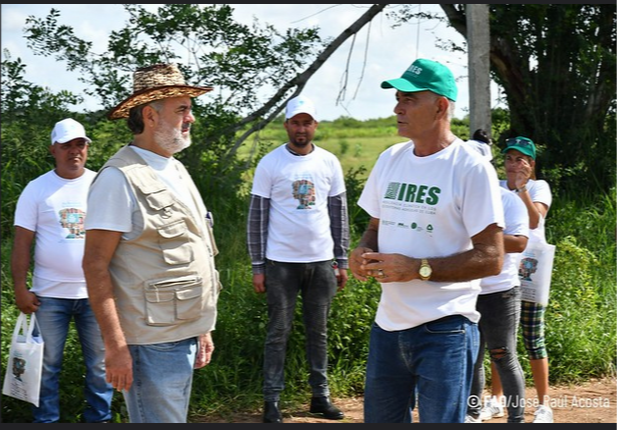
The collaboration between FAO and the Cuban government is an example of how international support can be a catalyst for change. It is a long-standing collaboration that has now proven its effectiveness in times of emergency following natural disasters and a coordinated and agile response.
By Maritza Gutiérrez
The collaboration between FAO and the Cuban government is an example of how international support can be a catalyst for change. It is a long-standing collaboration that has now proven its effectiveness in times of emergency following natural disasters and a coordinated and agile response.
Agriculture in Cuba has always been a fundamental pillar of its economy and culture, but climatic adversities, the siege by the United States, bureaucratic obstacles and the international scenario of multiple crises have placed this sector in a complex situation.
In this context, the Food and Agriculture Organization of the United Nations (FAO) is committed to supporting the recovery of agriculture on the island by implementing specific strategies aimed at improving food security and promoting sustainable practices.
A challenging context
For years, Cuban agriculture has faced significant challenges, from the economic embargo to natural disasters such as hurricanes and drought. The combination of these adversities has affected both production and access to food, leading to a growing dependence on imports. Despite these challenges, the country has shown remarkable resilience and, with the right support, can move toward more sustainable and productive agriculture.
FAO's intervention
In response to the current situation, FAO has developed specific programs to strengthen Cuban agriculture. One of the key approaches is the promotion of sustainable agriculture, which allows farmers to adapt to changing environmental conditions while increasing productivity, and which seeks not only to increase food production but also to protect the environment and ensure the sustainable use of resources.
FAO has implemented initiatives to train farmers and extension workers in ecological farming practices, such as agroecology, which seeks to integrate traditional techniques with modern knowledge. This not only increases resilience to climate change, but also promotes biodiversity and improves soil health.
Food security
Another key aspect of FAO's support in Cuba is the improvement of food security. The Organization has worked to implement monitoring and evaluation systems to identify food shortages and design appropriate policies, and to diversify agricultural production by promoting the cultivation of local and organic varieties that are more resistant to pests and diseases.
To address the current situation, FAO has facilitated access to quality seeds and appropriate technologies that can be used by small- and medium-scale farmers. This effort is vital, as many of them lack the resources to purchase agricultural inputs to maximize their production.
Strengthening cooperatives
FAO has also emphasized the strengthening of agricultural cooperatives, an important feature of the Cuban agricultural model.
These entities not only allow farmers to collaborate and share resources, but also provide a space for education and training on sustainable agricultural practices.
By strengthening cooperatives, FAO seeks to promote self-management and local capacity, ensuring that communities are active participants in making decisions about their food production and distribution.
Innovation and technology
The use of technology is another essential component of FAO's strategy.
The organization has promoted the adoption of technological tools that improve the efficiency of agricultural production. From smart irrigation systems to mobile applications that help farmers manage their crops, innovation is becoming a crucial ally in the recovery of Cuba's agricultural sector.
In addition, FAO has promoted research and development of new crop varieties that are more resilient to climate change and require fewer chemical inputs.
These advances are essential to ensure the long-term sustainability of agriculture in Cuba.
Post-hurricane initiatives
Following the impact of Hurricane Oscar in the eastern province of Guantánamo last October, FAO reported that it will provide assistance focused on the rehabilitation of local crop, sheep and goat, and fish production.
Approximately 140,000 people will benefit in the municipalities of San Antonio del Sur, Imías, Maisí and Baracoa.
A total of $680,000 will be allocated to provide seeds, irrigation systems, solar pumps, roofs and agricultural tools.
In addition, 6,850 farmers will receive training in good agricultural practices and efficient resource management, as well as support for coffee, cocoa and coconut producers, and reforestation activities.
Looking to the future
The collaboration between FAO and the Cuban Government is an example of how international support can be a catalyst for change: while the challenges are many, implementing sustainable agricultural practices, improving food security, strengthening cooperatives and integrating technology offer a clear path to agricultural recovery.
Cuba has the potential to become a leader in sustainable agriculture in the region, taking advantage of its rich biodiversity and human capital. With FAO's continued support and the commitment of its farmers, the country can not only overcome current adversities, but also build a more prosperous and sustainable future for all its people.
In conclusion, FAO's support for agriculture in Cuba is a beacon of hope in difficult times. By promoting sustainability, innovation and empowering local communities, a positive future for agricultural production on the island is in sight. With every seed planted, the promise of a more secure, sustainable and prosperous future is also planted.

